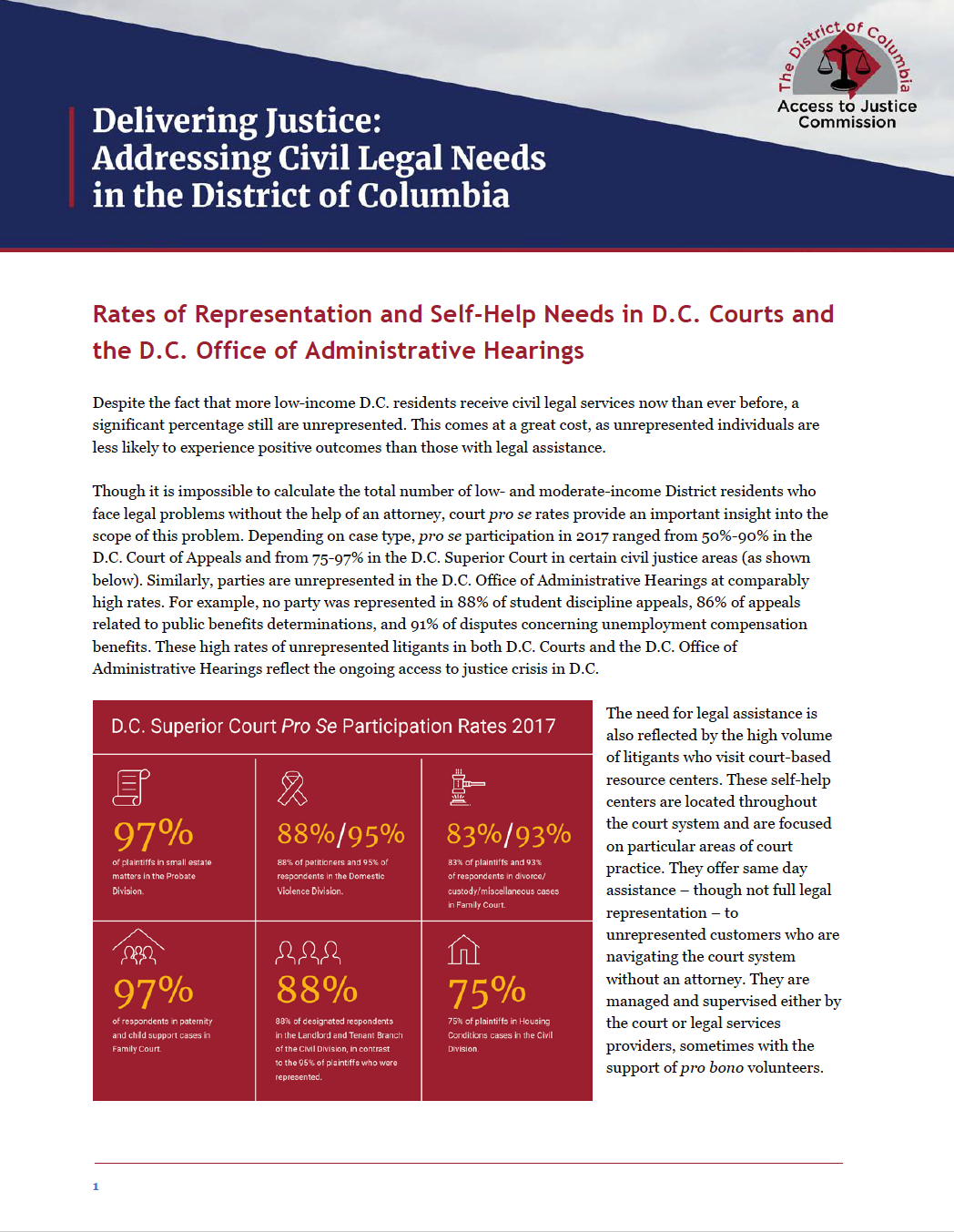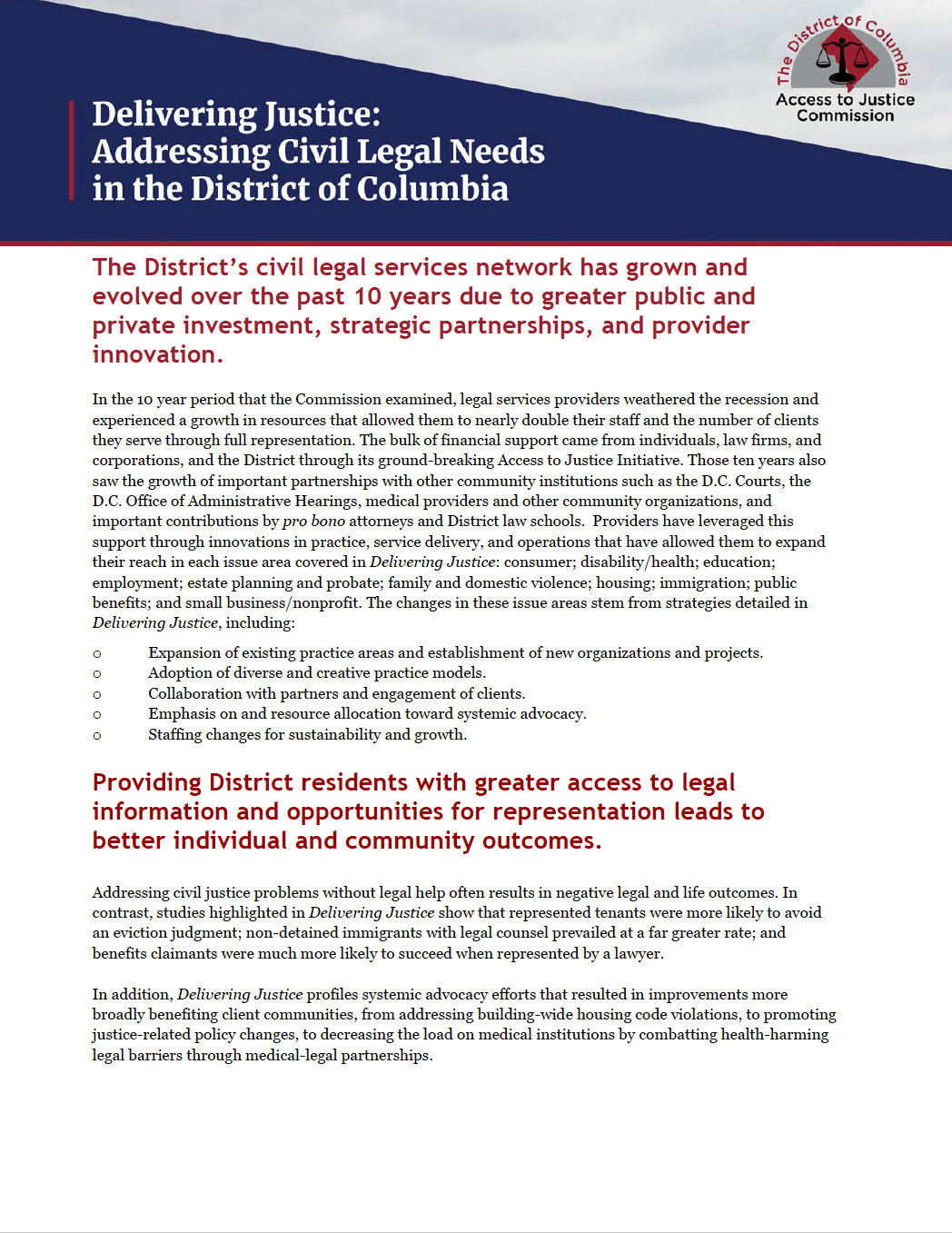Report Summaries
These documents provide highlights from the Commission’s 2019 report Delivering Justice: Addressing Civil Legal Needs in the District of Columbia.


Client Stories
Every day, low- and moderate-income District residents experience civil legal needs. Here are some of their stories, and the vital work legal services attorneys provided to address those needs.
Fraud and the American Dream
Ms. Rodriguez’s dream quickly became a nightmare as she faced a foreclosure action in D.C. Superior Court.Ms. Rodriguez, a low-income, Spanish-speaking woman, had dreamed of settling down with her husband, young daughter, and elderly mother and owning a small home. After working for years, often 7 days a week, that dream became a reality when in 2007 she finally bought her own house. Like many homebuyers during this time, particularly low-income people of color, she was targeted by a subprime mortgage lender. Unbeknownst to her, the two mortgage loans she received had predatory features. She made her payments on time for a number of years, but then fell behind as her mortgage payments increased substantially. This came at the worst possible time, when her income was shrinking after she cut back on work to care for her newborn daughter.
Ms. Rodriguez’s dream quickly became a nightmare as she faced a foreclosure action in D.C. Superior Court. Fortunately, when she appeared in court for a scheduled hearing, she met a legal services attorney participating in a court-based project. With her attorney’s help, she not only avoided foreclosure, but also obtained a loan modification that enabled her to bring her mortgage current and make affordable monthly payments going forward.
Coming to Court for Help

Ms. Graham arrived at the D.C. Bar Pro Bono Center’s Landlord Tenant Resource Center with a live writ, facing eviction the next day. She explained her situation to a volunteer attorney at the resource center. The case had been based on a lease violation related to the tenant having a dog in the unit. The dog was an emotional support animal and the plaintiff had a note from a doctor stating that the dog was necessary for her son’s medical condition. Although the tenant was aware the case had been filed, the tenant never appeared for any hearings in the case because she had been told by the property manager that she only needed to submit some paperwork and that the case would be dismissed. The case was not dismissed, however, and the tenant ultimately received a default judgment and had a live writ.
The tenant was referred directly to the D.C. Bar Pro Bono Center’s on-call Attorney-of-the-Day for same day representation to stay the writ and file a motion to vacate the default judgment. After having the writ stayed, the Attorney-of-the-Day continued to represent the tenant at a later scheduled hearing on her motion to vacate the default judgment. At that hearing, the landlord tried to introduce evidence that there was no need for a reasonable accommodation and went so far as to subpoena the medical provider who had written the note. The attorney won the argument to have the default vacated. Immediately after the motion was granted, the plaintiff dismissed the case.
Protecting Seniors from Exploitation

Ms. Martin was a 78-year-old woman living with her husband on a fixed income. Despite being nearly deaf and with limited sight, she was the primary caretaker for her developmentally disabled adult granddaughter, Joan. One day, Joan attempted to purchase a car, but the dealership required a co-signer. A salesperson drove alone to the address Joan provided for Ms. Martin’s home. This man confronted Ms. Martin and directed her to sign a folded piece of paper for her granddaughter. What he failed to tell her is that by signing, she (not Joan) would become the primary buyer of the car. Caught off guard, exhausted, and wanting to help her granddaughter, Ms. Martin signed. Once she realized what had happened, she tried to reach the dealership to cancel the contract, but her calls went unanswered.
A pro bono attorney working with a legal services lawyer was able to negotiate the return of the car to the dealership in exchange for a cancellation of the contract. The attorney also worked out an agreement with the underwriter of the original loan to erase any negative information on Ms. Martin’s credit report resulting from the original contract.
At Risk of Losing a Home Due to a Medical Crisis
Ms. Ward was a single working mother who became a proud homeowner after years of saving. Unfortunately, Ms. Ward fell behind on her mortgage payments when a blood clot left her with unforeseen medical expenses. She eventually hired a law firm that promised to help her avoid foreclosure. But when her lender filed a foreclosure action, her lawyers failed to appear in court or do anything to defend her case. One day, a stranger came to Ms. Ward’s door and informed her that he had purchased her home at a foreclosure auction.
One day, a stranger came to Ms. Ward’s door and informed her that he had purchased her home at a foreclosure auction.She soon discovered that the sale had occurred after a default judgment was entered against her in the foreclosure case. Ms. Ward was devastated that the law firm she had retained and had been paying for a year had failed her.
Ms. Ward came to a legal services organization for help. Legal services attorneys first prevented her from being forced out of her home by the auction purchaser. Next, they successfully argued that she never had been properly served in the case and the court vacated the default judgment and reversed the foreclosure sale. The attorneys then helped Ms. Ward secure a loan modification that lowered her interest rate and brought her mortgage current. Finally, the legal services organization teamed up with a pro Bono attorney from a private law firm to help Ms. Ward bring a malpractice action against her previous lawyers, which was eventually settled.
Maintaining Needed Services
He relied on his personal care aide to ambulate safely to the restroom, to take his medication correctly, and to go out into the community.Mr. Lee reached out to a legal services provider after receiving a notice that his personal care aide hours were being cut. He relied on his personal care aide to ambulate safely to the restroom, to take his medication correctly, and to go out into the community. Because Medicaid’s decision to cut these hours was scheduled for an administrative hearing, the matter was escalated immediately to a legal services attorney, who in just a 10-day period worked extensively with Mr. Lee’s medical provider and Medicaid to resolve the multiple issues preventing the hours from being approved. The legal services attorney collaborated with opposing counsel from the D.C. Department of Health Care Finance and was able to resolve the matter before the benefits were cut and prior to the hearing date. With the help of his attorney, Mr. Lee was able to maintain his hours for the next 12 months.
Educational Access for Court-Involved Students with Disabilities

John was first found eligible for special education services while detained in D.C’s long-term juvenile facility on a delinquency charge. He could not read, despite the fact that he was in the 10th grade and had been enrolled in D.C. Public Schools (“DCPS”) since Kindergarten. He spent over four months in solitary confinement at D.C. Jail. During that time, he was provided work packets but no instruction or support. Given his inability to read, he could not complete the work packets on his own.
A team of special education legal services attorneys brought a complaint on John’s behalf against DCPS, the Office of the State Superintendent for Education, and the D.C. Department of Corrections. As a result of their successful legal advocacy, John received 119 hours of tutoring, 36 hours of behavior support services, 7 hours of speech/language services, $3,000 toward tuition for a post-secondary education or training program, and a laptop with software for students with learning disabilities. When John was released from D.C. Jail, he immediately enrolled in high school, worked diligently throughout the school year to complete his requirements, and ultimately graduated.
Discrimination in the Workplace
With that settlement in hand to support her new family, Ms. Douglas was spared from returning to a hostile workplace.Ms. Douglas was an African American office manager with a high-risk pregnancy. Her supervisor refused to honor the accommodations her doctor recommended, including regular breaks for meals to address her erratic blood sugar. Ms. Douglas’ coworkers were not understanding about her need for breaks and made derogatory comments to her when she had to delay a work task. While they treated Ms. Douglas with contempt, coworkers held a baby shower for a white colleague who also was pregnant. Ultimately, Ms. Douglas was forced out on early leave and her baby was born prematurely.
A legal services attorney pursued claims of discrimination and denial of accommodations against Ms. Douglas’ employer and secured a $57,000 settlement. With that settlement in hand to support her new family, Ms. Douglas was spared from returning to a hostile workplace.
Fixing Housing Conditions… and Health
These unsafe housing conditions exacerbated her son’s chronic asthma and led to frightening, dangerous asthma attacks.A legal services attorney met Ms. Higgins through a medical-legal partnership. Ms. Higgins’ son was a regular visitor to the emergency room. Ms. Higgins reported to the legal services attorney that her apartment had problems with the air conditioning unit, the air filter had never been changed, the apartment was infested with mice, and there were holes in the walls. These unsafe housing conditions exacerbated her son’s chronic asthma and led to frightening, dangerous asthma attacks. The landlord’s only solution to her son’s worsening health condition was giving her mouse traps. The legal services attorney immediately took legal action to make sure Ms. Higgins’ landlord completed the appropriate repairs. As a result, her son’s condition started to improve. Today, he feels better – and is no longer a regular in the emergency room.
The Intersection of Probate and Housing

Mr. Jackson faced foreclosure on the house that he had lived in for decades. A reverse mortgage became due when his wife, the borrower, passed away. Mr. Jackson was now facing two legal issues: the foreclosure and the need to probate his wife’s estate. A legal services attorney helped Mr. Jackson avoid foreclosure by probating his wife’s estate and transferring the title into Mr. Jackson’s name. In addition, the attorney was able to help Mr. Jackson identify a long-term solution to maintaining the home by using applicable U.S. Department of Housing and Urban Development surviving spouse rules that allowed him to assume the loan and maintain his homeownership.
Securing Custody

Ms. Charles is the single mother of an outgoing and happy 4-year-old daughter, Alexis, whom she has raised entirely on her own. The man who alleges to be Alexis’ father (paternity had never been established) filed a case requesting joint custody. Because he has serious drug abuse issues, including regular PCP use, had a history of physically and sexually abusing Ms. Charles, and has never been involved in Alexis’ life, Ms. Charles had serious concerns about his involvement. Ms. Charles and her Legal Aid lawyers fought the request for joint custody. The court ultimately awarded Ms. Charles sole custody with any visitation between the alleged father and Alexis to be at her discretion.
Ms. Charles receives TANF and had previously assigned her right to collect child support to the Government. During the course of the custody case, the Government filed a child support case against the alleged father in order to establish paternity and put a child support order into place against him. Ms. Charles ultimately opposed this case, because she was deeply afraid of what the alleged father might do to her or Alexis if he were ordered to pay child support. With the help of her legal services lawyers, Ms. Charles was able to persuade the Government to dismiss the child support case.
Finding Safety after Domestic Violence
Ms. Cook’s partner tightly controlled her every movement.Ms. Cook’s partner tightly controlled her every movement. He tracked her location by phone, checked her social media postings daily, and scrolled through her phone each night. When she changed her phone password, he became enraged and struck her face, breaking her glasses. After she fled to bathroom, he grabbed a knife and threatened to cut her in front of their two young children. He then choked her until she passed out.
After more than a year of escalating violence, Ms. Cook sought help from legal services providers at a domestic violence resource clinic. A team of attorneys represented her in her petition for a civil protection order and defended against a petition her partner had filed against her based on false claims. The court eventually granted Ms. Cook a protection order along with full custody of her children. Her team of attorneys also connected Ms. Cook with housing assistance and counseling for her and her children to process the trauma they’d all experienced.
Removing a Tenant’s Debt

Ms. Murphy was a 74-year-old client facing eviction due to the $10,000 debt she owed her landlord. A legal services attorney in court for another case met Ms. 1 Murphy, who was there without representation. The attorney helped Ms. Murphy request a continuance so they could meet to discuss her case. During their meeting, the attorney learned that Ms. Murphy’s long-term partner unexpectedly left at a time when she needed to undergo several medical procedures. By the time she left the hospital, her rent debt had ballooned to nearly $10,000. The attorney worked with the client to obtain $6,000 from the Emergency Rental Assistance Payment program. After months of negotiation, the landlord agreed to remove the client’s partner from the lease, transfer the tenancy fully into her name, waive the remaining $4,000, and dismiss the eviction action.
Seeking Help for Immigrant Youth
While in detention, Silvio attended a “know your rights” presentation conducted by legal services attorneys and participated in an intake to determine his eligibility for legal relief from deportation.Silvio was born in El Salvador and lived there for much of his life with his mother. His father was not involved in his life. When he turned 15, Silvio’s mother moved to the U.S., but he remained behind. Soon, a gang threatened Silvio and demanded that he join and pay them. As the threats worsened, Silvio’s mother sent for him to come to the U.S. so that he could be safe. Silvio was detained after he arrived, but was eventually released to his mother, stepfather, and siblings.
While in detention, Silvio attended a “know your rights” presentation conducted by legal services attorneys and participated in an intake to determine his eligibility for legal relief from deportation. He continued to work with those attorneys after his release to pursue Special Immigrant Juvenile Status (“SIJS”). The attorneys first worked with Silvio and his mother to obtain an order from D.C. Superior Court stating that he met the elements of SIJS. With that order, the attorneys helped him to apply for a SIJS Visa. Though it may take several years to obtain the SIJS Visa, once it has been granted, legal services attorneys will help him apply for a green card. In the meantime, Silvio has graduated from high school with good grades and is applying to the University of the District of Columbia.
Overcoming Obstacles to Receive Benefits
Not only did she lose her cash assistance, but she lost a related benefit that had helped her secure a spot in an educational program.Having received a notice that she needed to recertify for her TANF benefits, Ms. Samson turned in the necessary paperwork at a local government service center. When she called to verify that her paperwork had been processed, she was told that it had not been scanned into the system; she was advised to submit the paperwork again, which she did. That paperwork also was not processed. As a result, Ms. Samson’s TANF benefits were cut off. Not only did she lose her cash assistance, but she lost a related benefit that had helped her secure a spot in an educational program. Ms. Samson reached out to a legal services attorney, who was able to get her benefits restarted so she could resume her access to the program. Sadly, Ms. Samson still had to delay her enrollment in the program another 7 months.
Helping One Helps Many Others

When Nicole Lynn Lewis reflected on the obstacles she experienced as a teen parent transitioning from high school to college, she decided to turn her professional attention to other struggling teen parents with a desire to finish college. In 2010, Lewis launched Generation Hope, a nonprofit organization that helps teen parents enter and finish college. Generation Hope provides scholarships of up to $2,400 a year in college tuition and also offers mentoring partnerships. This gives teen parents in the D.C. area not only financial assistance but also much-needed emotional support. Since its inception, Generation Hope has celebrated as 51 teen parents have earned college degrees with its support.
One key to the nonprofit’s success has been its years-long partnership with the D.C. Bar Pro Bono Center. In 2010, the Pro Bono Center matched Generation Hope with a pro bono attorney specializing in tax law to help the organization apply to the IRS for tax-exempt status as a 501(c)(3) nonprofit. “That tax exemption was not only important — it was vital for us to be able to fundraise and fully launch the organization,” Lewis explains.
In years since, the Pro Bono Center has helped Generation Hope receive the critical legal help it needs to develop an employee manual, create compensation and performance evaluation policies, protect its intellectual property, and draft a risk-management plan. The nonprofit has also benefited from several of the Pro Bono Center’s Nonprofit Legal Assistance Program clinics. Generation Hope staff and board members have had the opportunity to meet one-on-one with pro bono counsel to review their insurance policies, intellectual property protections, and governance policies. Generation Hope is just one shining example of how the Pro Bono Center can help nonprofits grow.





 Washington Graphic Services
Washington Graphic Services